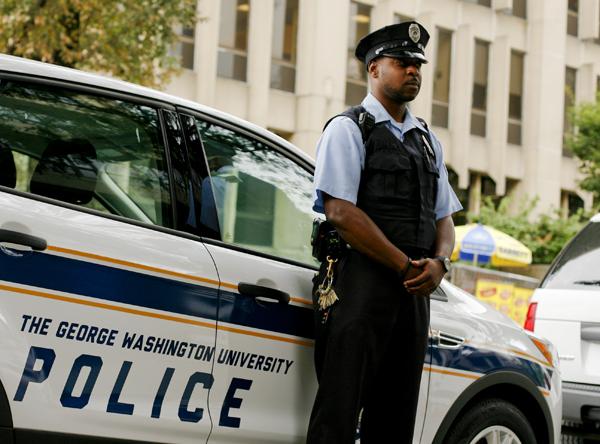As GW looks to empower its police to break up rowdy parties off campus, it would join several other urban universities nationwide that have taken similar measures to improve safety in risky neighborhoods.
A wave of colleges across the country have worked to integrate campus police with city forces in recent years – providing plenty of success models as GW bands together with other District colleges to push through a possible D.C. Council proposal this fall to calm neighbor tensions.
But the attempt has drawn questions from some city officials, neighbors and civil rights groups. And unlike colleges in Detroit, Philadelphia and Baltimore, GW is stressing improved neighbor relations to justify the expanded jurisdiction, rather than bulking up student safety measures.
That kind of off-campus authority has been granted to colleges including Temple, Kent State and Wayne State universities and the University of Maryland – all aiming to increase security beyond campus lines, while GW does not intend to send its police deep into D.C.
“These are our students and we want to make sure things are secure for them whether they’re on campus or not,” said Michquel Penn, a community resources officer for Kent State University in Ohio.
Nearly all of the five universities stepped in to help city police departments that are stretched thin.
Philadelphia police have shared a dispatch system with Temple University and the University of Pennsylvania for about a decade, a security official at Temple said.
Sharing resources allows the schools and Philadelphia police to monitor calls and decide what force is best equipped to respond, said Charles Leone, who serves as Temple’s deputy director of campus safety.
At the University of Maryland at Baltimore, shared jurisdiction with city police has allowed campus officers to take action not only on university property, but also on public land.
Lt. Dave Scott said Wayne State officers receive the same training as Detroit police and have policing power over the entire city, though they typically stay in the five miles surrounding the campus.
“Our campus is not clearly defined with 12 foot walls and wrought iron gates,” Scott said. “If we were exclusively commissioned as campus police, we would have no authority on public streets or sidewalks, or while traveling from Point A to Point B.”
Scott added that since the city declared bankruptcy, the Wayne State force sometimes responds faster to calls than the Detroit police.
“With the way the city has been going resource-wise in the past few years, the Detroit police have been able to do less and less, so the people in our area have been conditioned to call us directly. They don’t even bother to call 911,” he said.
David Martin, a criminal justice researcher at Wayne State, said university police forces can be helpful to city police departments and the trend of expanding jurisdictions may continue.
“Policing is certainly headed in this direction, as communications and technology have improved greatly,” Martin said in an email.
And for Kent State, at least, the policy seems to be working. Though the university is in its first year of shared jurisdiction with town police, Penn said she’s already seen a decline in noise complaints and other disruptions.
“I’ve been here about seven-and-a-half years and this was the first year we didn’t have a single arrest during the end-of-the-year celebration. That could very well be because the area is more frequently patrolled than it was in the past,” Penn said.
It’s still unclear precisely how far campus police will be allowed to act off campus under the potential D.C. Council bill. GW has also been tight-lipped about when a bill could come before the Council, with officials only saying that GW has to wait to reach a consensus with other D.C. schools.
Leroy James, Howard University’s police chief who heads the Consortium of Universities of the Washington Metropolitan Area’s public safety committee, said research for a proposal to the D.C. Council is ongoing.
“There has not been any discussion since the school year started,” he said, adding that the Consortium has not settled on a timeline.
Two UPD officers were reprimanded by the city for acting off campus last year, when responding to incidents beyond GW’s grounds was a regular duty.
UPD Chief Kevin Hay said his 100 sworn officers can only make arrests on GW’s campus or off the grounds when chasing a suspect.
GW’s police also has authority over property “immediately adjacent” to campus, he said in an interview Friday, adding that the rule is “not clearly defined.”
Renee McPhatter, assistant vice president for governmental relations, told local representatives this month that the University didn’t intend to expand UPD jurisdiction across city wards. She also said GW is not interested in arming police officers, which it considered four years ago.
“GW is not requesting arrest powers,” McPhatter told members of the Foggy Bottom and West End Advisory Neighborhood Commission. “We want to be able to enforce the Student Code of Conduct very narrowly.”
This post was updated to reflect the following correction:
The Hatchet incorrectly reported the gender of Michquel Penn. We regret this error.







